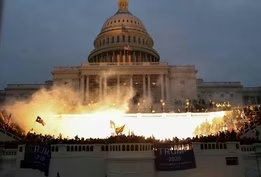
South Korea in political chaos with martial law attempt
Clip: 12/3/2024 | 7m 43sVideo has Closed Captions
South Korea's president throws nation into political chaos with martial law attempt
For the first time since South Korea became a democracy some 40 years ago, a president declared martial law. But hours later, the opposition and members of his own party in parliament rejected the order. Nick Schifrin discussed what led to this undemocratic move by President Yoon Suk Yeol and what's next for South Korea with Frank Jannuzi.
Problems playing video? | Closed Captioning Feedback
Problems playing video? | Closed Captioning Feedback
Major corporate funding for the PBS News Hour is provided by BDO, BNSF, Consumer Cellular, American Cruise Lines, and Raymond James. Funding for the PBS NewsHour Weekend is provided by...

South Korea in political chaos with martial law attempt
Clip: 12/3/2024 | 7m 43sVideo has Closed Captions
For the first time since South Korea became a democracy some 40 years ago, a president declared martial law. But hours later, the opposition and members of his own party in parliament rejected the order. Nick Schifrin discussed what led to this undemocratic move by President Yoon Suk Yeol and what's next for South Korea with Frank Jannuzi.
Problems playing video? | Closed Captioning Feedback
How to Watch PBS News Hour
PBS News Hour is available to stream on pbs.org and the free PBS App, available on iPhone, Apple TV, Android TV, Android smartphones, Amazon Fire TV, Amazon Fire Tablet, Roku, Samsung Smart TV, and Vizio.
Providing Support for PBS.org
Learn Moreabout PBS online sponsorshipWelcome to the NewsHour.
Today, for the first time since South Korea became a democracy some 40 years ago, a South Korean president declared martial law.
But hours later, the opposition and members of his own party in parliament rejected the order and President Yoon School has now rescinded it.
Nick Schifrin is here following this story.
Nick, what's the latest?
Jeff, a senior administration official tells me tonight the US said to South Korean officials that Yoon's declaration was, quote, untenable and urged them to reverse it quickly.
And the official warns that Yoon might not survive this episode that could have threaten the stability of one of the US's most important allies.
And in Seoul tonight, they stormed the institution they pledged to protect.
Special Forces soldiers acting under martial law, fought with protesters and pushed back opposition politicians from entering parliament.
Look inside.
The only thing that stopped soldiers from the parliament floor fell.
Furniture deployed by opposition staffers that allowed Parliament to vote down the martial law Declaration 192 zero, a step demanded not only by the Leader of the Opposition, who live streamed himself jumping over the fence to get to Parliament, but also by the leader of one's own party who said, quote, The president's declaration of martial law is wrong with our people.
We will stop it.
Afterwards, security forces rushed out of parliament.
Protesters celebrated a battle plan and soon revoked his own declaration.
I will accept the National Assembly's demand and lift martial law through a cabinet meeting.
Six hours earlier.
Yoon, whose approval rating has been under 20% and who's resisted investigations into his wife, accused the opposition of being infiltrated by North Korea.
I declare martial law to eradicate the despicable pro North Korean anti-state forces that are plundering the freedom and happiness of our people.
His decree prohibited all political activities, imposed government control over the media, and banned ongoing strikes by South Korean doctors.
But thanks to immediate protests, it's not clear any of that actually happened.
A long, long time ago.
For the last two years, President Jung has been a vital U.S. ally.
And the supreme leader of normal.
The music used to make movies.
Singing from the same Biden administration song sheet to advocate for global democracy and expand regional cooperation against North Korea and China.
Behind the scenes, the U.S. wanted to see the crisis end.
We have every hope and expectation that any political disputes will be resolved peacefully and in accordance with the rule of law.
The senior U.S. official told me that some of Yoon's own advisors were, quote, shocked and humiliated by his declaration.
And tonight, it appears Yoon could soon be impeached or forced to resign.
To discuss this day of crisis and what comes next.
I'm joined by Frank Januzzi, president and CEO of the Maureen and Mike Mansfield Foundation, which works to foster understanding between the United States and nations across Asia.
He thanks very much.
Welcome back.
Good evening to the NewsHour.
Do you think this political crisis at this point is over?
No.
There are still more shoes to drop.
Specifically, I believe that President Nguyen is going to be hard pressed both by impeachment and by voices within his own party to consider stepping down.
But if he does so, it doesn't just end his own presidency.
It potentially ends the ruling party's occupancy of the presidential office because special elections would be held within 60 days.
And at the present time, the opposition is well positioned to win those.
Let me get to the implications of that, especially with President Trump becoming president just in a couple of months.
But first, let's go back to today.
Why do you think you declared martial law?
Look, what precipitated this crisis were numerous frustrations of the president.
First, he can't get a budget through the Congress, which is controlled by the opposition party.
They're investigating his wife for allegations of various fraudulent stock manipulations, as well as taking gifts.
And they've also been, frankly, working to impeach him already.
His popularity has been very low.
And this has the hallmarks of a desperation move of a man not very well accustomed to politics.
Speaking of politics, a senior administration official who I spoke to today, who I was quoting earlier, told me the message to South Korean officials was that the declaration was, quote, untenable and to reverse it while they could.
But the official also said it wasn't US pressure that made Yuan change course.
Do you believe that?
I think US pressure was essential, but it was not the only ingredient.
US pressure deprived you of any hope that he might have had that the Biden administration would stand by him while he shredded South Korea's democracy.
But it was the voices in his own party that were decisive, much as Republican leaders once were responsible for Nixon choosing to resign.
It was the opposition party in league with the People's Power Party together, whose own party that forced him to rescind this martial law order.
As you mentioned, if one doesn't survived, it's expected the Democratic Party, the opposition would would come to power.
And as I alluded to, that is the party that was the partner of Donald Trump to reach out to North Korean leader Kim Jong un.
So what would the opposition's priorities be when it came when when it would come to North Korea and China?
Well, on the one hand.
The opposition party today is less pro-China than they used to be, and they're more really impressed with the importance of the US.
Japan.
Ah, okay.
Triangle.
But they would open the door potentially to a new diplomatic initiative with North Korea, something that President Yuan has staunchly opposed and even had.
Biden wanted to make such an initiative.
President Yoon would have stood in his way.
And so this is guessing, perhaps.
But how would they work with the Trump administration?
I would expect that the main issues will still be tensions over things like host nation support for U.S. alliance forces on the peninsula, as well as.
Soldiers in South Korea and how much they pay and.
How much South Korea pays the US to help support that presence, as well as trade frictions.
Because President Trump has signaled his intention to impose tariffs, which would have a negative effect on the South Korean economy.
So those tensions will still be there.
But when it comes to the potential outreach toward North Korea, there may be an opening.
And finally, this has been a dramatic day.
You have mentioned democracy.
You've mentioned the Constitution multiple times.
What do you think this day says about South Korea's democracy?
Well, Nick, I was with Biden 25 years ago when he welcomed Kim de Jong, really the father of South Korean democracy, to Washington, D.C., in 2001.
And I think what this really says is that South Korea's democracy, for all of its warts, is resilient in the face of a move to restore some kind of authoritarianism.
And so it gives me hope that notwithstanding the the street protests and the the tussle of South Korean politics, that their democracy is resilient.
Frank Januzzi, thank you very much.
Thank you.
Bank of America CEO on economy and Trump's second term
Video has Closed Captions
Clip: 12/3/2024 | 9m 28s | Bank of America CEO on interest rates, tariffs and Trump's second term (9m 28s)
Syrians describe living in crossfire of brutal civil war
Video has Closed Captions
Clip: 12/3/2024 | 7m 23s | Syrians describe living in the crossfire of a brutal civil war for 13 years (7m 23s)
What Trump’s return to power will mean for Jan. 6 rioters
Video has Closed Captions
Clip: 12/3/2024 | 6m 19s | What Trump’s return to power will mean for Jan. 6 rioters (6m 19s)
Why so many Americans are dissatisfied with a solid economy
Video has Closed Captions
Clip: 12/3/2024 | 7m 33s | Why so many Americans are dissatisfied with the seemingly solid economy (7m 33s)
Providing Support for PBS.org
Learn Moreabout PBS online sponsorship
- News and Public Affairs

FRONTLINE is investigative journalism that questions, explains and changes our world.

- News and Public Affairs

Amanpour and Company features conversations with leaders and decision makers.












Support for PBS provided by:
Major corporate funding for the PBS News Hour is provided by BDO, BNSF, Consumer Cellular, American Cruise Lines, and Raymond James. Funding for the PBS NewsHour Weekend is provided by...




